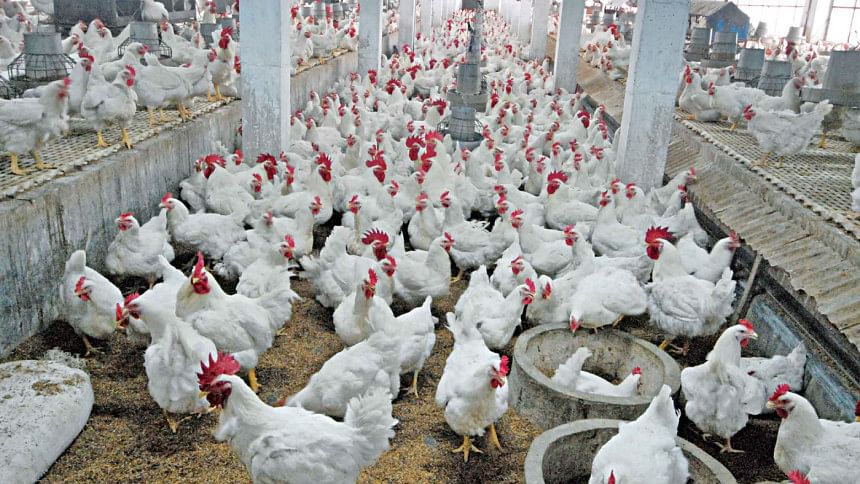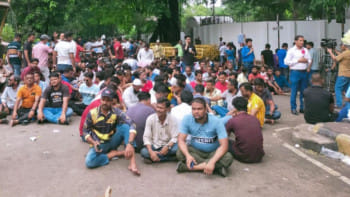The growth and challenges of Bangladesh's poultry industry

The poultry industry in Bangladesh stands as a cornerstone of the nation's food security, economic growth, and employment. As a result of the country's growing population and the acceleration of urbanisation, there is a growing demand for chicken and eggs, which presents significant prospects for the industry to expand.
The rise of the sector, however, is accompanied by a number of issues that need to be solved in order to guarantee the business's continued viability over the long term.
The growth of the middle class and the rise in disposable incomes have both contributed to an increase in the consumption of poultry products, which has resulted in the industry being an essential component of the economy of the country.
An increase in the consumption of poultry has occurred as a result of this spike in demand, which has offered numerous prospects for increased production.
Additionally, there is a substantial potential for exports, in addition to local consumer demand. In light of the fact that the demand for halal poultry is increasing in countries such as the Middle East and Asia, Bangladesh is in an excellent position to capitalise on these prospects.
Through the combination of its robust agricultural basis and its competence in poultry farming, the country has the potential to significantly expand its presence on the international scene.
The expansion of the sector has been significantly influenced by the funding and assistance by the government. Poultry farmers have been given the confidence and resources necessary to expand their operations as a result of tax exemptions, subsidies, and financial aid.
It is because of the government's commitment to strengthening the sector that Bangladesh's poultry industry is able to maintain its highly competitive status. The use of contemporary agricultural technology is another factor that is helping with the expansion of the industry.
Increasing production, lowering prices, and putting the poultry business in a position to be sustainable over the long run are all outcomes that are being brought about by factors like automation, genetic advancements, and sophisticated farming practices.
The poultry business in Bangladesh is confronted with a number of hazards and problems that have the ability to limit its success, despite the fact that it has the capacity to expand. The breakout of viruses such as avian influenza and Newcastle disease, which may cause production to be disrupted and erode customer trust, is one of the most severe hazards that can occur.
The instability of feed costs is still another significant obstacle to overcome. Because of the industry's dependence on imported feed materials like maize and soybeans, variations in world pricing may have a substantial impact on the profitability of poultry farmers and lead to an increase in the total cost of production.
Extreme weather conditions, including floods and droughts, have the potential to disrupt both poultry farming and the production of feed. Climate change adds an extra risk factor because of its potential for disruption. Because of this, the sector is susceptible to disturbances that are caused by climate change.
Competition from bigger companies and goods imported from other countries is also becoming more intense. It may be difficult for local farmers, especially those who operate on a smaller scale, to compete with bigger commercial enterprises that have been in operation for longer. There is a lack of regular implementation of biosecurity measures, and there are issues about public health, especially in relation to the excessive use of antibiotics and pesticides in chicken production.
These are additional hazards that need to be addressed. Disease outbreaks and concerns about the safety of consumers might be detrimental to the industry's image and may hinder its potential for expansion if suitable regulation is not implemented.
The expansion of the commercial agricultural sector gives enormous prospects for investment and employment, especially in rural regions. Due to the fact that customers are becoming more health concerned, niche industries such as organic and free-range chicken products are gaining more and more popularity.
Convenience meals, such as processed chicken items which include sausages and nuggets, are becoming more popular among urban consumers. This trend is expected to continue. As a result of the hectic nature of contemporary living, there is a growing demand for poultry products that are either ready to be cooked or ready to be consumed. This creates an opportunity for the sector that is both profitable and rewarding. A further factor that has contributed to the expansion of the poultry industry is the proliferation of online buying platforms.
Consumers have an easier time gaining access to both fresh and processed chicken goods to e-commerce platforms such as Chaldal, Daraz, and Meena, which further drives market demand.
There are still many obstacles to overcome in order to guarantee the quality and safety of chicken products, despite the efforts that have been made by the Bangladesh Food Safety Authority (BFSA) to guarantee food safety.
Concerns continue to be raised, especially in rural regions, about issues such as antibiotic residues, adulteration, and insufficient cold storage facilities. It is very necessary to make increased investments in processing facilities, slaughterhouses, and cold chain infrastructure in order to handle these conditions.
The poultry processing business is expanding, and the enhancement of storage and transport methods will be essential to guaranteeing the quality of the product from the farm to the consumer's table.
In addition, the supply chain for poultry, which includes breeders, hatcheries, feed mills, poultry farms, distributors, and retailers, has to be simplified. A decrease in profitability is being brought about by difficulties in transportation, an absence of cold storage, and the existence of intermediaries. Some new answers to these difficulties include integrated supply chains and contract farming. These solutions ensure that goods are delivered to customers in a manner that is both more efficient and profitable.
It is becoming more vital to place a greater emphasis on animal welfare as the poultry business continues to grow via expansion. For the purpose of ensuring that agricultural techniques are ethical, it is vital to have more stringent laws for humane treatment, improved housing, and decreased stocking densities. It is essential to address these ethical problems in order to preserve the public's faith in the sector, especially in light of the increased knowledge among consumers.
The future of the poultry industry in Bangladesh is bright, but it will need continuing investments in technology, improved regulation, and efforts to solve critical concerns like disease management, environmental sustainability, and supply chain optimisation.
Overall, the future of the poultry business in Bangladesh is bright. The poultry industry has the potential to continue to flourish and play a pivotal role in guaranteeing the nation's food security and driving economic development at the national level if it is provided with the appropriate support and policies.
The three-day WPSA-BB Fair 2025 (World's Poultry Science Association - Bangladesh Branch) from February 20-22 at Bangladesh China Friendship Exhibition Center, Dhaka is set to be a landmark event for the poultry industry, with the primary goal of promoting industry growth by showcasing advancements in poultry farming, including innovative technologies, best practices, and sustainable production methods.
The fair will facilitate knowledge sharing, allowing experts, farmers, and companies to exchange ideas on cutting-edge research, disease management, and food safety. It aims to foster collaboration among local and international stakeholders, strengthening the poultry value chain and creating new business opportunities.
Additionally, the event will focus on sustainability, ethical practices, and environmental concerns, promoting eco-friendly production methods, waste utilization, and animal welfare. Another key objective is to highlight Bangladesh's growing export potential, particularly in the Middle East and Asia, by connecting local producers with international buyers. The fair will highlight the role of poultry farming in rural development, particularly in empowering women and marginalised communities, while also promoting gender equality and youth involvement.
Lastly, networking opportunities will allow professionals and businesses to form new partnerships and explore investment opportunities, further driving the industry's growth.
Overall, the WPSA-BB Fair 2025 aims to position Bangladesh's poultry industry as a global leader, addressing key challenges and ensuring long-term sustainability.
The author is a poultry supply chain specialist. He can be reached at [email protected]

 For all latest news, follow The Daily Star's Google News channel.
For all latest news, follow The Daily Star's Google News channel. 



Comments